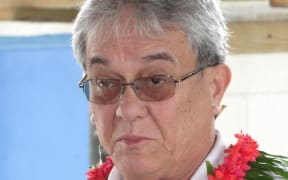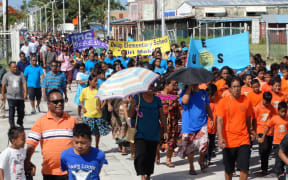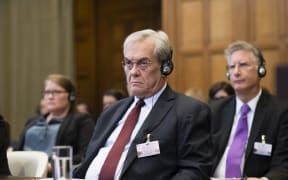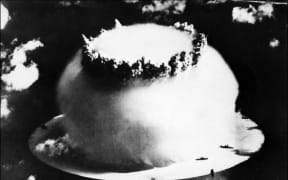Marshall Islands Climate Ambassador Tony de Brum is being described as "a giant of history" who was catapulted to the forefront of the global climate action movement.
Mr de Brum, 72, died Tuesday at Majuro hospital following an extended struggle with cancer.
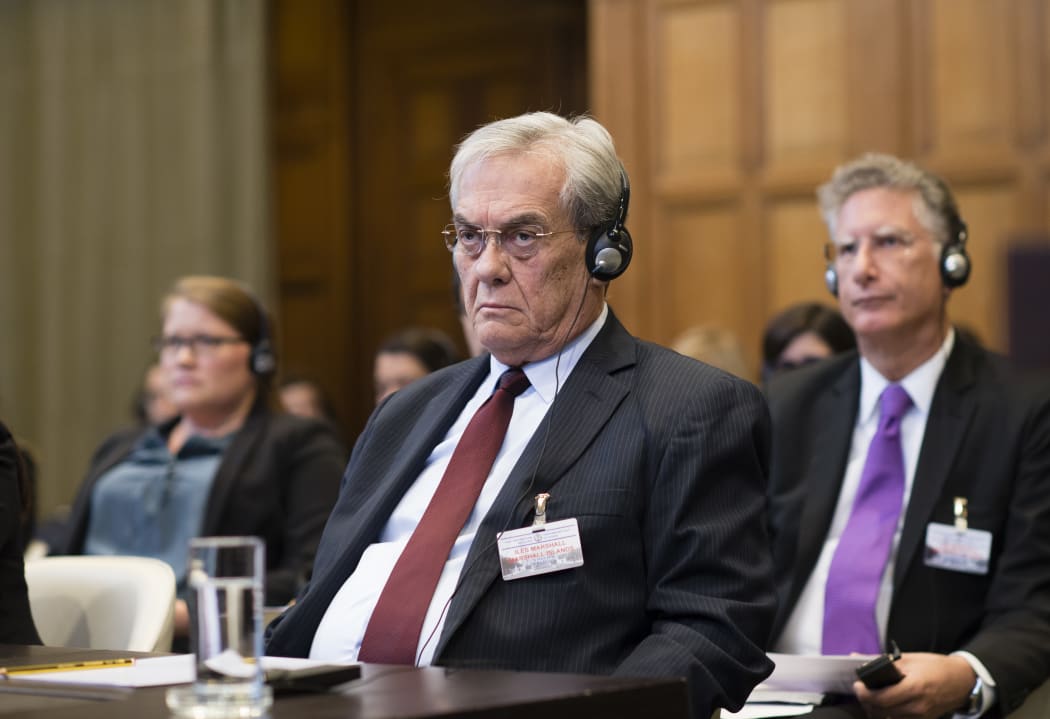
Tony de Brum, at the International Court of Justice in The Hague Photo: International Court of Justice
A lifelong critic of the United States' nuclear weapons testing program in the Marshall Islands - which he witnessed first-hand, living on the downwind northern atoll of Likiep as a child in the 1950s - Mr de Brum was a frequent testifier at the United Nations and at US Congressional hearings on the nuclear legacy in the islands.
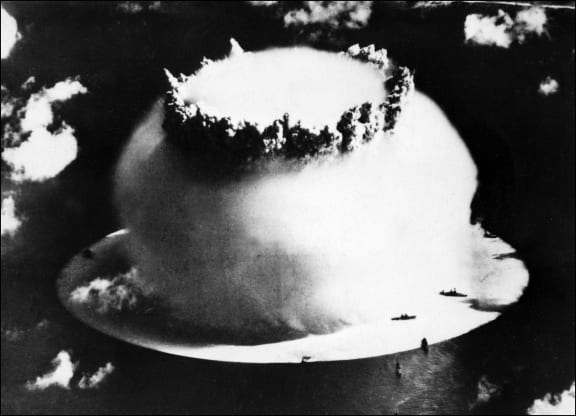
Tony de Brum witnessed the US' nuclear testing programme first hand Photo: STF / AFP
In 2014, he engaged with American and international lawyers, who filed lawsuits on behalf of the Marshall Islands in the International Court of Justice and in American courts against nine nuclear powers. The aim was to get the courts to order these nations to address stalled nuclear disarmament talks.
Although ultimately dismissed by these courts, the lawsuits focused global attention on nuclear weapons and disarmament, led to him being nominated for the Nobel Peace Prize, and gained him other international anti-nuclear awards.
But it was in the global climate change arena that Mr de Brum came into his own from 2012.
A man of verbal eloquence and sharp wit
His verbal eloquence, sharp wit and dedication catapulted him to the forefront of the global climate action movement.
Mr de Brum attended countless climate conferences, became a sought-after commentator by the world's leading television and print media, and a go-to person in international climate negotiations. He relentlessly hammered the message that a lack of action to reduce carbon emissions would doom his nation and many others.
Mr de Brum's climate activism culminated in his playing a central role in the landmark climate accord reached in the final hours of the Paris Climate Summit in December 2015.
"He was a giant of history, a legend in every meaning of the word, and a custodian of our shared future," Marshall Islands President Hilda Heine said.
In the Marshall Islands, Mr de Brum got his start in politics as a spokesman and right-hand man for the nation's founding father and inaugural president Amata Kabua.
As foreign secretary, he was the country's lead negotiator on the Compact of Free Association with the United States that produced a controversial draft in the early 1980s opposed by nuclear test affected islanders and leaders from Kwajalein Atoll, host of the US Army's missile testing range.
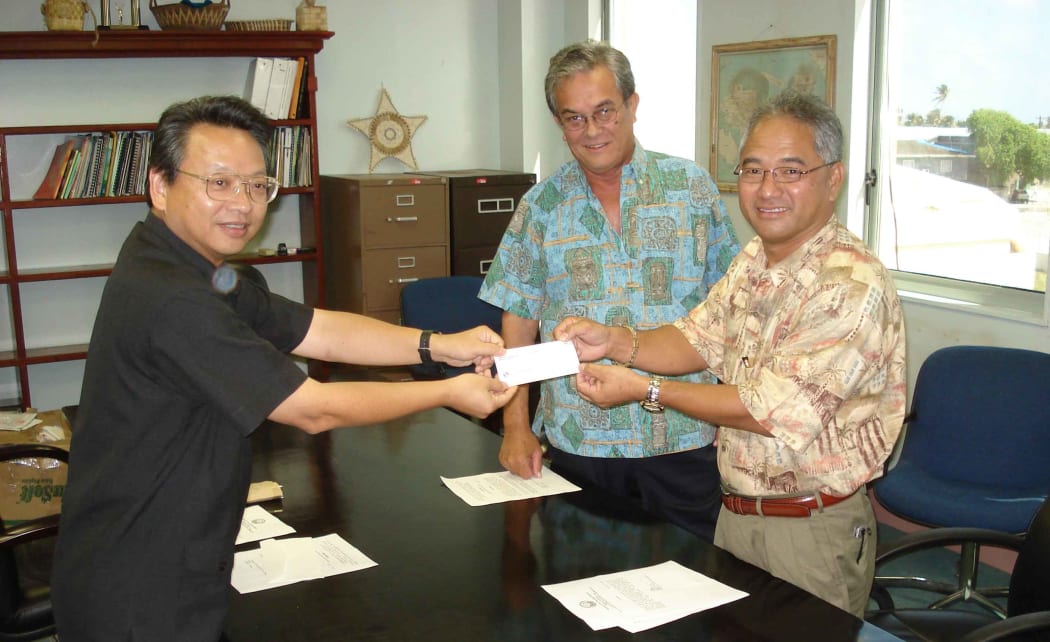
Tony de Brum, centre, with Taiwan Ambassador Bruce Linghu, left, and Marshall Islands Finance Minister Jack Ading, in 2008 Photo: Giff Johnson
Linked to that first draft of the treaty, Mr de Brum also engineered an agreement with US Ambassador Fred Zeder for a two-option referendum in the Marshall Islands - either the compact or independence. It was called off by the US government after the Defense Department raised alarm over the independence option, in light of widespread opposition to this version of the compact.
Oscar de Brum, the country's top civil servant, later took over as lead negotiator for the document, which ultimately came into effect in 1986.
Four terms in parliament
Tony de Brum stood for election in 1983, the country's second national election following establishment of constitutional government four years earlier. He easily won what would be the first of four terms in the country's parliament representing Majuro, the capital.
In his first term, he was named to Cabinet by Mr Kabua. In 1986, he was given the health portfolio, where he oversaw sweeping changes to the country's health care system with the expansion of innovative preventive health services.
Mr Kabua dropped the charismatic and outspoken Mr de Brum from Cabinet beginning in 1988. Thereafter, he became a critic of Mr Kabua's government, leading to his participation in the founding of the opposition Ralik Ratak Democratic Party (RRDP) in the lead-up to the 1991 election. Despite an intense campaign between the RRDP and Mr Kabua's party, Mr Kabua's near-total dominance of the parliament did not change.
Voters, who returned Mr Kabua and senators aligned with him election after election, were also inclined to keep Mr de Brum in parliament, where he engaged in lively public debates with the dominant government party.
Two years following the first president's death in 1996, Mr de Brum was returned to Cabinet by Mr Kabua's successor, his cousin Imata Kabua, the paramount chief for Kwajalein. As Finance Minister, Mr de Brum and Foreign Minister Phillip Muller orchestrated the country's switch from diplomatic relations with China to Taiwan in late 1998, resulting in Taiwan becoming the country's second leading donor behind the United States.
He and Mr Muller were swept out of office in 1999 in an election that led to the seating of the country's first commoner president, Kessai Note. He lost a comeback bid in the 2003 national election.
Re-emergence on the political front
Though he played an advisory role to numerous political leaders, it was not until a special election in 2007, following the death in late 2006 of Kwajalein Senator Justin de Brum, that Mr de Brum re-emerged politically with a seat in the parliament as a representative of Kwajalein with the backing of former president Imata Kabua.
With the national election later that year ousting Mr Note after two terms, Mr de Brum was back in the thick of things as new president Litowka Tomeing's foreign minister. He championed objections to the land use agreement included in the Compact of Free Association's second funding agreement, concluded in 2003 by the Note administration, for long-term use of the Kwajalein missile range.
It wasn't long before Mr Tomeing and Mr de Brum were at loggerheads, resulting in Mr Note dropping Mr de Brum from Cabinet in early 2009, and a retort in the form of an unsuccessful vote of no confidence brought by his own party in April of that year. Political tumult continued throughout the year with the country's only successful vote of no confidence that October.
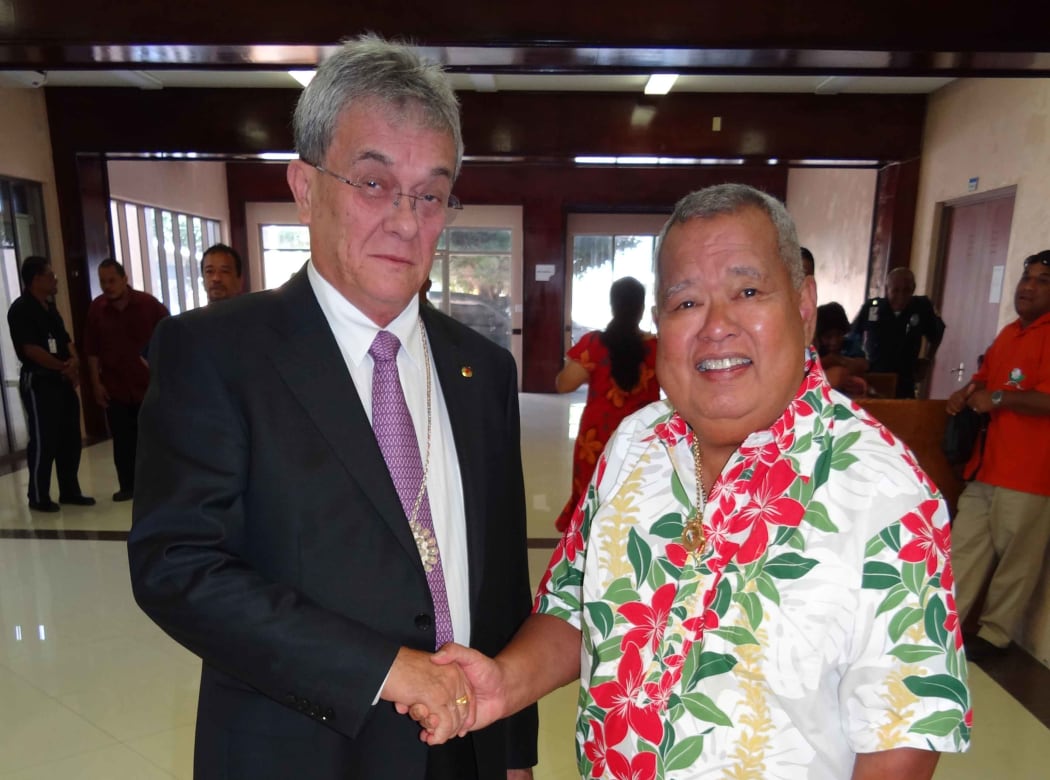
Tony de Brum pictured with former Marshall Islands president and paramount chief Imata Kabua in 2012 Photo: Giff Johnson
Mr de Brum was elected for his seventh and final term in office in 2011, and a cabinet posting under President Christopher Loeak, which provided the platform for his engagement in global climate negotiations with the Paris Agreement as his crowning achievement.
"His tireless efforts on the world stage were instrumental in securing the Paris Agreement," said Dr Heine - the current president.
"On this day that Tony passed, we also held our final traditional funeral ceremony for Minister Mattlan Zackhras who passed away less than two weeks ago.
"While our nation may have lost two of our finest men, and the Earth two of its fiercest champions, the best thing we can all do to honour their legacies is to keep up the battle for our future - to which they dedicated their lives. We now carry their torch."
Mr de Brum is survived by his wife, Rosalie, three children, 10 grandchildren and five great-grandchildren.
